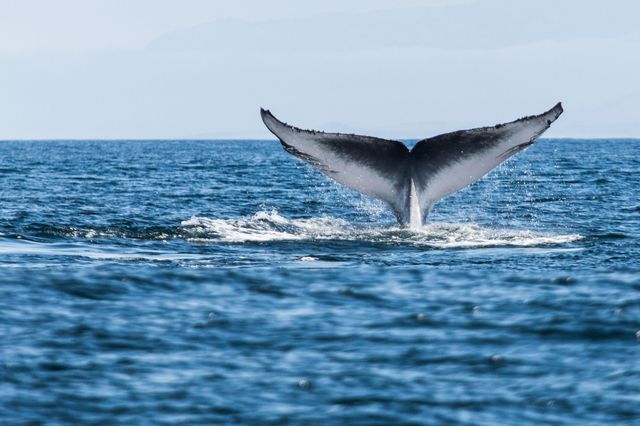The ocean is a noisy place. Beyond the typical noises like crashing waves there is the increasing presence of ships to makes things even louder. Above the water, this might not seem like a big deal, but below the waves, noise from ocean liners and large container ships can travel for miles and upset organisms like whales and dolphins that depend on their own noises to communicate and survive.
New research from Oregon State University suggests that blue whales are learning to adapt by changing the frequency of their songs. Essentially, they're starting to communicate on a different audio band. The researchers believe that the whales are doing this deliberately to avoid interference from human sounds.
Whale songs have been dropping in pitch for a while now, and scientists have been noticing it for about two decades. They found that whale songs were produced by blowing air over the animal's vocal cords, and that whales can change the frequency of their calls by blowing air faster or slower. Previously, scientists thought the frequency of whale songs was controlled by the size of certain resonating chambers, making the pitch of a whale song an unchangeable part of the whale's biology. This study shows that whales can control the pitch, deliberately changing it up or down when they want.
"Our study shows that blue whales in particular—and perhaps other baleen whales in general—may be making their harmonious sounds in a much different way than previously thought," says lead author Robert Dziak.
So why are whales deliberately lowering the frequency of their calls? The scientists aren't completely sure, and one theory states it might be due to rebounding populations after the decline of commercial whaling. But another possible cause is the increase in noise from ocean ships.
"In addition to vibrant natural sounds—especially waves breaking on the beach—a few long-term studies have documented a substantial increase in ocean noise over several decades from expanding container shipping traffic," says study author Joe Haxel. "It may be possible the whales are modulating their vocalization frequency in response to an increase in human-generated noise. They are essentially trying to find a radio channel that has less static to communicate in."
There's no way to find out for sure right now, but it might be possible to find out an answer in a decade or two. At least one shipping company is building autonomous, electric ships, and if battery-powered container ships become more common it'll greatly cut down on ocean noise. With any luck, the ocean will be a little quieter in a few years and whales can go back to singing their normal tunes.
Source: Oregon State University














